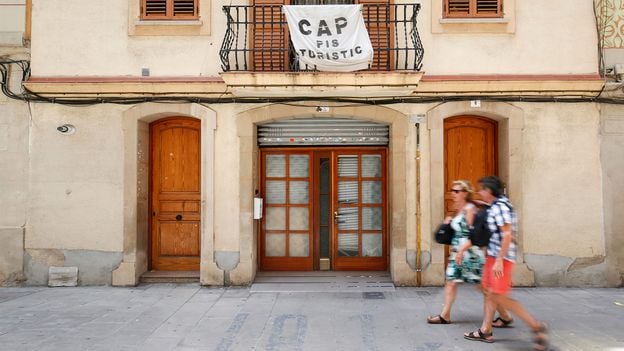On 21 June, Barcelona mayor Jaume Collboni announced plans to ban short term rentals in the city starting in November 2028. The decision is designed to solve what Collboni described as “Barcelona’s biggest problem” – the housing crisis that has seen residents and workers priced out of the market – by returning the 10,000 apartments currently listed as short-term rentals on Airbnb and other platforms into the housing market.
Barcelona is not the only city to be strongly regulating – or even banning – short-term rentals outright. It has been illegal since September 2023 to rent out an apartment as a short-term let in New York City unless you are registered with the city and you are present in the apartment when someone is staying – a change also made to assuage the city’s housing crisis. Berlin banned Airbnbs and short-term rentals back in 2014, bringing them back under tight restrictions in 2018; and in many of California’s coastal cities, including Santa Monica, short-term rentals are either banned or highly restricted.
In British Columbia, Canada, Premier David Eby put the issue succinctly as he clarified new short-term rental rules: “If you’re flipping homes, if you’re buying places to do short-term rental, if you’re buying a home to leave it vacant, we have consistently, publicly, repeatedly sent the message: Do not compete with families and individuals that are looking for a place to live with your investment dollars.”



I stayed at an Airbnb last weekend. Instead of paying over five hundred a night for a tiny non luxurious hotel room, I paid 300 a night (total, after splitting was 150) a night for a massive two bedroom apartment two blocks from the hotel room. Parking, everything included.
It was cheaper and better than a hotel. Are you somehow gonna make the hotel lower their price? For that to happen, they would need competition.
I don’t know if that’s the absolute norm. Sure, Airbnb might be easier to get a bigger place, but I find they’re usually pricier than hotels, unless you’re with a big group. I personally would rather stay in hotels just because it’s a more consistent experience. Airbnbs vary wildly and each host is different. You also have more responsibilities. I’d rather just be an anonymous customer with zero responsibilities.
Oh yeah I’m with you there. I click the box for total price and skim the rules. All I had to do at this place was put dirty towels on the floor and run the dishwasher (never used dishes so didn’t have to). But all those places with chores? Lol get fucked, I’m with you completely. Hotel all the way. They can’t bill me for cleaning and also make me do chores. I don’t do my own chores.
Hotels and airbnb killed mom and pop bnbs.
How so, and why should I care?
Airbnb offered an unfair advantage (venture capital and centralized) in cornering the market on a streamlined platform, vs decentralized bnbs. Then when covid came, the individual bnbs operating on a tight margin shuttered, while airbnb prevailed (with massive layoffs). Both the hotel industry and airbnb were able to jack up prices due to loss of competition from mom&pops.
I can’t answer your second question.
Airbnb competes with itself, due to the individual hosts putting up their own listings. Or are you accusing them of being a cartel?
Airbnbs are not actually bnbs. They don’t have free breakfast. They are just a room.
Businesses fail all the time. As long as they continue to have what I want at a price I want with the convenience I want, I’ll keep using it. Just like ubers and DoorDash.
Who cares if VCs waste their money on an unprofitable business as long as the hosts don’t create a cartel?
That is far on the norm these days. Many AirBnBs add on a ton of fees like a massive cleaning fee but still require you to clean up so the cost comes out to be more than a hotel and you still have to clean up and there are a ton of house rules. It has only been recently that AirBnB gave you the option of seeing the extra fees while searching but it’s still not the default option. Their customer service kind of sucks too. I stayed in a place in LA that had sewage backing up into the sinks and the place itself was pretty gross. They offered a slight discount on the night we stayed and allowed us to cancel the second night. A hotel would have probably comped us a night and given us a decent room.
There are still diamonds in the rough though which are generally people who genuinely have a mother in law unit or room spare and they live in the rest of the place. Most of them are done by corporations though who are simply looking for lower taxation.
You are not entitled to cheap lodging. While locals need homes to live. Cities can only absorb so much tourism before it becomes unlivable and unaffordable for people to live in. Just look at Venice. It’s not only that homes become unaffordable, amenities that serve the locals start to disappear since everything starts to cater tourists.
I used to live in Amsterdam and in a some streets there are just way too many souvenir, stroopwafel and Nutella shops while local grocers are pushed out because of rising rent.
And poor people aren’t entitled to live in deseriable areas. There is a balance to be struck. If locals can’t serve the tourists(due to long commutes, unaffordable housing whatever), there will be no one to serve the tourists so the balance will swing in the other direction.